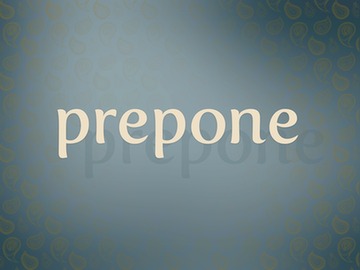India has the second-largest English-speaking population in the world, and just as some English words have roots from Hindi or Urdu, such as bungalow, dungaree, and shampoo, there are some distinctly English words that are used in distinctly Indian ways.

Used widely by India's English speakers, the word is largely unheard outside the subcontinent.
A perfect example is prepone, a word made to oppose postpone. If postpone means “to put off to a later time,” then prepone, logically, must mean “to move to an earlier time.” Here are some examples of its use:
Tournament organisers have decided to prepone the inaugural ceremony.
They have preponed the film’s release.
A petition has been filed for preponing the date of the hearing.
The term is used in official and professional writing. It is not slang, but part of a regionally distinct variety of English called Indian English (or sometimes Hinglish, from Hindi + English, another word we’re watching). Prepone has been in use for over a hundred years.
But prepone also has an interesting prehistory. It was used as far back as the early 1500s with a slightly different meaning, “to place in front of, to set before,” according to the Oxford English Dictionary. Here’s an example from a religious text from 1549:
I do prepone and set the Lord alwaye before myne eyes.
This sense is obsolete, but the modern Indian prepone has a lot going for it: it’s easy to say and spell, it’s made of familiar parts, and it’s an efficient way to say something for which we have no other word. It may well catch on in the rest of the English-speaking world.
Words We're Watching talks about words we are increasingly seeing in use but that have not yet met our criteria for entry.




